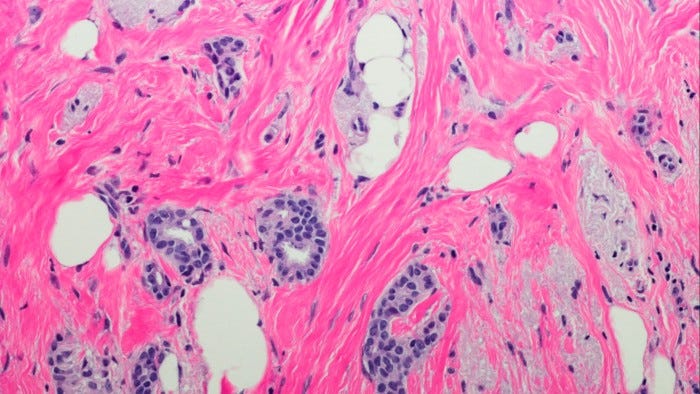the health strategist
institute for strategic health transformation
& digital technology
Joaquim Cardoso MSc.
Chief Research and Strategy Officer (CRSO),
Chief Editor and Senior Advisor
November 17, 2023
What is the message?
The central message of the article revolves around the significant potential of Artificial Intelligence (AI) in revolutionizing breast cancer detection and diagnoses.
It highlights the key findings of research published in Nature Medicine, emphasizing the following central points:
- AI Enhances Breast Cancer Detection Rates: The primary focus is on AI’s ability to identify up to 13% more breast cancer cases compared to conventional methods used by radiologists. This represents a substantial improvement in the detection of potentially life-threatening cancers that might otherwise be missed in non-AI screenings.
- 2.Improved Accuracy and Speed: The article emphasizes how AI technology, exemplified by the Mia tool developed by Kheiron Medical Technologies, not only enhances the accuracy of identifying malignant tissues but also significantly expedites the diagnostic process. It is suggested that AI could potentially save up to 45% of the time spent on breast cancer scan reading times.
- 3.Collaborative Future between AI and Radiologists: There’s an underlying message regarding the potential collaboration between AI technology and radiologists. It suggests that the integration of AI tools with the expertise of medical professionals could lead to more accurate diagnoses and improved clinical decision-making.
- 4.Transformative Potential in Cancer Care: The article underscores AI’s potential to transform cancer care, highlighting the importance of leveraging technology to improve early detection rates, thereby potentially saving more lives.
Overall, the central message of the article is that AI technology, as demonstrated through the research findings, has the capacity to significantly improve breast cancer detection rates, enhance diagnostic accuracy, and hold promise for transforming cancer care practices.
This is an Executive Summary of the article “AI boosts breast cancer detection rates, new research shows”, published on the Financial Times, and authored by Michael Peel.

Study shows potential of technology to improve and speed up medical diagnoses
Microscopic photo of a professionally prepared slide demonstrating breast tissue with ductal carcinoma: AI analysis flagged up to 13 per cent more cases than doctors had identified
Introduction
Recent research published in Nature Medicine showcases the substantial potential of Artificial Intelligence (AI) in revolutionizing breast cancer detection and accelerating medical diagnoses.
AI analysis has demonstrated the capability to identify up to 13% more breast cancer cases compared to conventional methods, addressing a significant proportion of missed cases (estimated at 20% or more) in non-AI screenings.
Key Findings & Arguments
Enhanced Detection Rates: The study, conducted on 25,000 women screened for breast cancer in Hungary using the AI tool “Mia” by Kheiron Medical Technologies, showed phased improvements in detection rates (5%, 10%, and 13%) over standard readings by multiple radiologists.
Identification of Invasive Cancers: The additional cancers detected by AI predominantly included invasive types, indicating the potential to catch aggressive and threatening forms of cancer that might be overlooked in traditional readings.
Improvement in Accuracy and Speed: The research underlines AI’s ability to enhance the accuracy of identifying malignant tissues while significantly expediting the diagnostic process, potentially saving up to 45% of breast cancer scan reading times.
Supporting Examples & Statistics
A similar study from Sweden highlighted AI-enhanced mammogram analysis, resulting in a comparable cancer detection rate to human double reading, reinforcing the reliability and efficacy of AI-driven diagnostics.
Dr. Katharine Halliday from the UK’s Royal College of Radiologists emphasizes the collaboration between AI and radiologists, foreseeing a future that harnesses the strengths of both for improved accuracy in diagnoses.
Future Prospects and Deployment
The successful piloting of Mia in 16 UK hospitals and its introduction in the US by Kheiron demonstrates the feasibility and imminent integration of AI technology in medical settings.
Researchers emphasize the need to expand this research globally, involving more countries and diverse AI systems, while continuing to monitor emerging cancer cases within study groups.
Conclusion
The study’s outcomes signify AI’s potential to significantly enhance breast cancer detection rates, emphasizing its role as a crucial tool in transforming cancer care and improving diagnostic accuracy.
Collaborative integration of AI with medical professionals holds promise for more accurate diagnoses, faster treatments, and potentially saving more lives through earlier detection of breast cancer.
This executive summary encapsulates the key research findings, examples, and implications of AI technology’s role in improving breast cancer detection rates and its broader impact on medical diagnostics.












